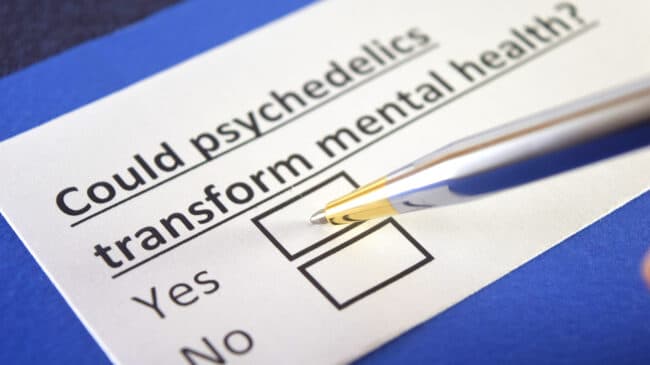Recent research into psychedelics reveals these substances could hold significant value as therapeutic treatments for a wide range of mental health conditions. Psilocybin, in particular, has recently garnered the interest of state policymakers, as lawmakers in a dozen states considered legislation this year to increase the availability of this mushroom-bound entheogen.
In a recent policy brief, Reason Foundation detailed the status of ongoing clinical trials and academic research into psilocybin. The research shows early but powerful evidence that psilocybin therapy is more effective than existing treatments for major depression. Its success is notable for helping individuals who have already attempted multiple treatments for their depression and have not found relief.
In clinical trials, one-third of patients who showed no response to at least two other forms of treatment for depression demonstrated lasting remission following a single treatment with psilocybin. It’s no wonder, then, that the U.S. Food and Drug Administration (FDA) has called psilocybin a “breakthrough therapy” for these conditions and may soon approve psilocybin-based pharmaceuticals.
Earlier-stage research also shows that psilocybin therapy may help treat dependency on alcohol or cigarettes. One study showed that two-thirds of smokers were able to successfully quit smoking for a full year after receiving psilocybin therapy. No other therapeutic approaches have this level of success for smoking cessation.
Psilocybin also shows potential use in fighting anxiety or treating neurodegenerative conditions like Alzheimer’s. The research into psilocybin as a therapeutic has shown enormous untapped potential.
Not all states are waiting for the FDA to approve psilocybin-based pharmaceutical products. Oregon voters passed Measure 109 in 2020 to set up a state-regulated marketplace for psilocybin services. Colorado voters legalized the possession of several natural psychedelics in 2022.
Although modern research into psychedelic substances like psilocybin is newly advancing, these substances have been around for millennia and served key ceremonial purposes within many indigenous religions. Even if scientists are just beginning to understand the potential physiological benefits of psilocybin, tribal practitioners have developed at least some understanding of its risks through centuries of use.
FDA-supervised trials are incredibly slow and costly. Drug makers spend an average of $1.7 billion to bring a new pharmaceutical to market. They recover those costs through drug pricing, which means approved pharmaceuticals will tend to be more costly than naturally occurring psychedelic substances.
States that choose to legalize psilocybin or other psychedelic therapies can bring citizens access to these therapies faster and cheaper. States have explored differing regulatory frameworks, but most involve the evaluation or guidance of a medical professional to ensure psychedelics are administered safely and productively.
Health care professionals need evidence-based guidelines and training to bring psychedelic therapies into mainstream medical practice. Policies to develop standards and address liability concerns will help ensure the safe and responsible use of these therapies. Additionally, determining the roles and licensure of health care professionals beyond physicians and psychologists in delivering psychedelic treatments is an important consideration for expanding access and meeting patient needs.
Oregon requires an initial medical evaluation of a patient to determine their suitability for treatment. It only allows psilocybin to be dispensed and consumed while the patient is at licensed premises for a second appointment. Patients cannot purchase psilocybin to take home with them. Oregon’s model also relies on extensive licensing fees and regulatory requirements that drive up the cost of these treatments.
Colorado, by contrast, allows adults to freely cultivate, consume, or donate natural psychedelic medicines to other adults. Early results indicate no notable public health or safety harms from this approach. Still, other states have explored allowing existing licensed mental health professionals to recommend or dispense psilocybin to their patients if they believe it can help.
This spring, Nevada and Washington passed legislation that sets the stage for those states to adopt a regulated marketplace. Each state created an administrative working group to recommend a regulatory structure to the next session of each legislature. California and Massachusetts continue to debate legalization proposals similar to Colorado’s.
Clearly, the trend is for more states to legalize natural psychedelics over the coming years. The research shows this could be a very positive development for individuals with a wide range of mental health needs.

